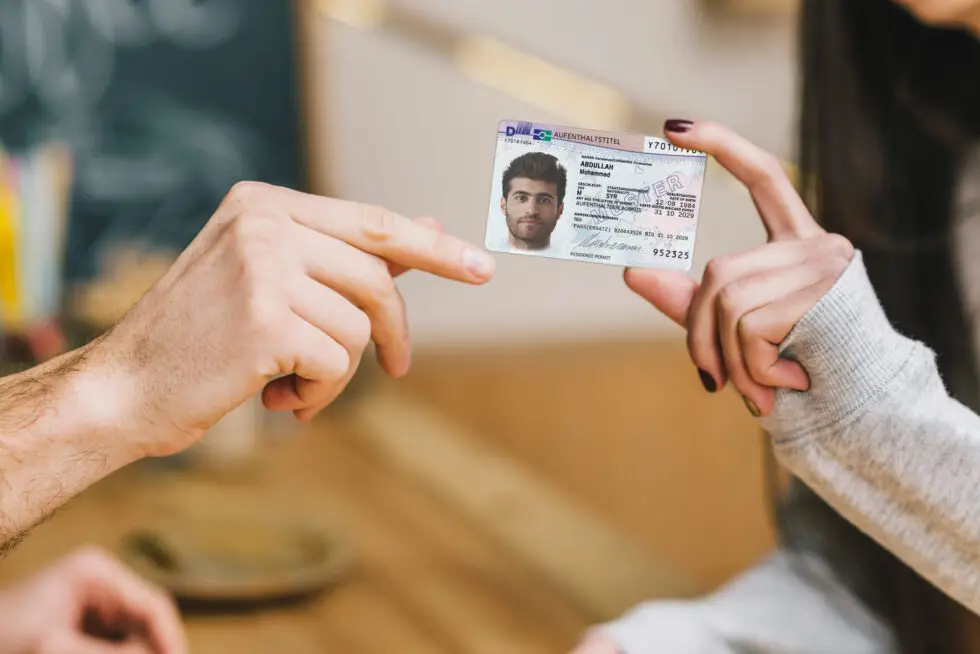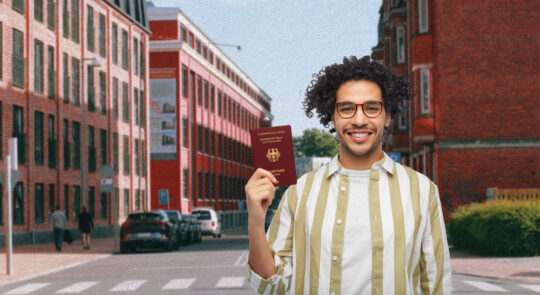What is § 18a AufenthG?
Residence permit Section 18a AufenthG has a background in employment law. In order for you to understand the various conditions and requirements for the right of residence, it is important that we first look at and analyze the background to Section 18a AufenthG. This will make it easier for you to understand and comprehend the special features.
Who gets § 18a AufenthG?
The Residence permit § 18a AufenthG is granted to foreigners who have a qualification in the form of vocational training in a specific occupational field. This vocational training must be recognized in Germany and may have been completed either in Germany or abroad.
What type of Residence permit is § 18a AufenthG ?
The Residence permit for employment and the integration of foreigners in Germany is a right of residence with a labor law background. The aim is to bind foreigners to Germany as skilled workers via Residence permit Section 18a AufenthG and to promote the integration of these people.
The aim is to open up prospects for foreign skilled workers in Germany, make Germany an attractive country for foreign skilled workers and at the same time effectively alleviate and combat demographic problems and the shortage of skilled workers in Germany.
The difference between § 18a and 18b AufenthG?
Residence permit 18a AufenthG differs from § 18b AufenthG in a number of respects. The biggest difference between the two residence permits is that § 18b AufenthG is linked to a recognized university degree.
Naturalization with § 18a AufenthG?
How do you obtain § 18a AufenthG?
There is a specific procedure for applying for § 18a AufenthG. It is helpful for the organization of your application if you use these points as a guide and ideally make a note of them. This will give you a reference point for the situation if you are at a certain point and do not know exactly which step is necessary next.
Organization of the documents for § 18a AufenthG
The first point when applying for § 18a AufenthG is to organize the documents for the Residence permit. Here it is important to be precise and thorough and to present arguments and evidence in favor of granting you the Residence permit for gainful employment and integration of foreigners in Germany.
Then contact your local Foreigners' office and organize the necessary application form. Complete this application form in full and sort through your documents again. When you contact Foreigners' office , arrange an appointment to submit your application for Section 18a AufenthG.
Obtain approval from the Federal Employment Agency for § 18a AufenthG
In addition to organizing the documents and contacting your Foreigners' office , it is important that you obtain approval from the Federal Employment Agency for the granting of a residence permit in accordance with § 18a AufenthG by the Foreigners' office .
The legal basis for this is § 39 AufenthG. It states that the Federal Agency must grant permission to issue the residence title in accordance with 18a AufenthG.
The reason for the required approval is that the Federal Agency checks the equal working conditions between foreign and German workers at your company and generally controls the conditions for employment.
Application for § 18a AufenthG
To apply, it is important that you attend the agreed appointment with Foreigners' office . This is where you submit the complete application for Residence permit § 18a AufenthG. From now on, you must be patient and wait for the decision and assessment of Foreigners' office .
Examination and issue § 18a AufenthG
The Foreigners' office has 12 weeks to decide on your application under Section 18a AufenthG. If it does not respond, you can submit a Lawsuit for failure of act to the administrative court, which will then set the authority a new deadline.
In most cases, this is followed by a positive decision. The validity of the residence permit depends on the duration of your employment contract and the approval of the Federal Employment Agency.
Revocation of § 18a AufenthG
Revocation proceedings against your Residence permit may be initiated in the event of serious criminal offenses under Section 54 AufenthG. In addition, your Residence permit may be revoked if your employment contract ends, as the requirements for Section 18a AufenthG no longer apply.
In this case, inform the authorities immediately, as otherwise you may be deprived of your residence permit due to failure to cooperate in accordance with § 51 AufenthG. If you do not have a new job, you can switch to Sec. 20 AufenthG (job search) and later return to Sec. 18a AufenthG with a new job.

Requirements for § 18a AufenthG
The requirements for § 18a AufenthG are extensive and relate to your qualifications and CV, the existing employment contract and how you can secure your life in Germany.
Securing a livelihood and B1 language skills
An important prerequisite and condition is that you, as an applicant for qualified employment with vocational training, can sufficiently secure your livelihood. The most important proof of this is your employment contract or a specific job offer from your new employer and the information it contains about your monthly salary.
Another requirement is B1 language skills for regulated professions (e.g. geriatric nurses). For non-regulated professions, the employer decides whether sufficient language skills are required.
Recognized vocational training in Germany
Another essential requirement for the Residence permit § 18a AufenthG is qualified vocational training that is recognized in Germany.
Alternative 3 years of employment in Germany
As an alternative to the options mentioned above, you can also obtain § 18a AufenthG if you can prove that you have been employed as a skilled worker in your profession in Germany for 3 years.
This will then be recognized as a qualification for § 18a AufenthG and is sufficient proof for you. You can therefore also obtain a Residence permit for qualified employment with vocational training by working as a specialist and expert in your professional field.
Housing, employer loyalty and other conditions
Sufficient living space is another important requirement. According to the General Administrative Regulations on the Residence Act § 2 Para. 4 AufenthG, sufficient living space is 12 square meters for each family member over the age of 6 and 10 square meters for each family member under the age of 6.
In addition, ancillary rooms such as the toilet, kitchen and bathroom must be usable. In order to obtain a residence permit, it is therefore important that you can prove that you have living space for yourself and your family.
Additional important requirements are that you have no previous convictions of more than 90 daily rates. In other words, you must not have any serious previous convictions.
It is also important that you comply with the passport requirement and that it is possible to clarify your identity. If it is not possible to obtain a valid passport or passport replacement, you must prove that you have tried to make it possible.
Employer loyalty is crucial in the case of Sec. 18a AufenthG. You are bound to the employer with whom you have an employment contract.
The employer obligation can be dissolved by the Employment Ordinance in accordance with clear requirements. These requirements apply if you have been working for an employer in Germany for 2 years and are subject to compulsory insurance or if you have been in the Federal Republic of Germany for 3 years without interruption on a tolerated, permitted or Residence permit basis.
In this case, you are no longer tied to your employer and are not dependent on your employer for your residence permit.
Documents and proof for § 18a AufenthG
The documents and evidence for Residence permit § 18a AufenthG are linked to the requirements for and are made up as follows:
- Proof of your livelihood (employment contract, proof of salary, etc.).
- Proof of B1 language certificate, if necessary.
- Proof of recognized qualified vocational training or studies at the same level or 3 years of professional experience as a specialist.
- Proof of sufficient living space in accordance with Section 2 (4) AufenthG.
- Proof that you have no serious criminal convictions.
- Proof of valid national passport

Advantages of § 18a AufenthG
The Residence permit § 18a AufenthG has several advantages. The positive aspects mainly relate to family reunification, Naturalization and Settlement permit. Here you can enjoy advantages over other residence rights with your Residence permit .
Possibility of family reunification with § 18a AufenthG
Unlike other Residence permit such as Residence permit for subsidiary protection, family reunification with your Residence permit is not a problem.
The requirement for family reunification under Section 18a AufenthG is that the marriage under Section 30 (1) AufenthG (reunification of spouses) existed before the residence permit was issued.
Your child under the age of 16 also has the option of obtaining a Residence permit if both parents have a Residence permit or you have custody of the child.
Family reunification of other family members is possible under more difficult conditions. There must be absolute cases of hardship. Theoretically, your family reunification is therefore limited to the close part of the nuclear family.
Another advantage of family reunification is that if you meet the requirements for Section 18a AufenthG, you will be able to secure a livelihood for yourself and your family. This means that the hurdles regarding proof are low for you and the probability is very high that the Foreigners' office 's prognosis regarding your family's livelihood will be positive.
Advantages for Naturalization and Settlement permit with Section 18a AufenthG
With regard to Naturalization and Settlement permit , you have many advantages with your Residence permit .
You already meet some of the requirements, such as the B1 language certificate or a means of subsistence. This makes it easier to organize the application for the documents. You will therefore have to organize fewer documents and the process will be less stressful for you than for people with other residence permits.
The probability of a positive prognosis with regard to securing your livelihood for the Settlement permit or the Naturalization is very high. This is another advantage, as the requirements for this part are not easy to achieve and a lot of evidence is required.
Disadvantage of § 18a AufenthG
You are more dependent on your employer than with other residence titles. If your employment relationship with the specified employer ends, you may initially fall under a different right of residence (Sec. 20 AufenthG) and be able to return to the Residence permit for foreigners with qualified vocational training if you take up a new job.
Your Residence permit is therefore very much tailored to the employment relationship with your employer and you are therefore in a form of dependency. This situation will of course change if you change your right of residence at some point and apply to Settlement permit .
An exception to the dependency requirement is if you have 2 years of employment subject to compulsory insurance in Germany or 3 years of uninterrupted residence with Tolerance permit, permit or Residence permit . In this case, you are exempt from the employer requirement.

Application for Settlement permit with § 18a AufenthG
The Settlement permit is already possible after 24 months with § 18a AufenthG.
The steps from § 18a AufenthG to the Settlement permit
The path from Section 18a AufenthG to a Settlement permit comprises the following steps:
- Prepare documents - Start organizing all the necessary documents at an early stage.
- Make an appointment - Contact the relevant Foreigners' office to make an appointment and obtain the application form.
- Submit application - Complete the form in full and submit it by the agreed deadline.
- Check by the authorities - The Foreigners' office will check your documents. If there are delays, a Lawsuit for failure of act may be useful.
- Confirmation and receipt of the Settlement permit - After successful verification, you will receive your card as proof of the Settlement permit.
Documents for the change from § 18a to Settlement permit
The documents for Settlement permit with § 18a AufenthG are closely linked to the conditions for Settlement permit , which you can find under § 9 AufenthG.
Securing your livelihood and the B1 certificate are two requirements that you already have to meet under § 18a AufenthG. In addition, you must have 36 months (for foreign qualifications) or 24 months (for domestic qualifications) of pension insurance contributions and proof of 2 or 3 years' residence with a legal Residence permit.
Furthermore, it is important that you have successfully completed a test life in Germany and can document this and that you have sufficient living space for yourself and your family and can prove that your identity has been clarified.
Settlement permit with § 18a AufenthG?
Application for Naturalization with § 18a AufenthG
The application for Naturalization is directly possible with § 18a AufenthG.
The steps from § 18a AufenthG to the Naturalization
The steps from your Residence permit to Naturalization are simple. It is important that you remember these steps. You can then check again and again during the process to see where you are with your naturalization application.
The steps can be summarized as follows:
- Fulfillment of all requirements and thus the organization of the necessary documents.
- Contact the naturalization authority and arrange an appointment to submit the application.
- At the same time, organization of the application form for Naturalization.
- Filling out the application for Naturalization.
- Checking the application for completeness
- Appearance at the appointment and submission of the application.
- If necessary: File a Lawsuit for failure of act after 12 weeks.
- Ceremonial granting of Naturalization with naturalization certificate.
The minimum requirement for Naturalization is 5 years of legal residence in Germany. With special integration achievements (C1 certificate and e.g. voluntary work) you can also be naturalized after 3 years.
Documents required for the application with § 18a AufenthG
Section 18a AufenthG has a number of positive effects when it comes to obtaining documents. As a rule, you already have the document for the B1 language certificate if you work in a regulated profession and do not need to organize it again. You already meet the requirements for securing your livelihood. Valid proof (wage certificates) is required here.
You also need to clarify your identity with your Residence permit . It is important that you can prove it with a valid document.
Further documents that you need according to § 10 StAG are listed below:
- Signed declaration of loyalty + commitment to the free democratic basic order.
- Proof of successful naturalization test.
- Proof of the required period of legal residence (at least 5 years).
FAQ - The most important questions and answers on § 18a AufenthG
§ Section 18a AufenthG allows skilled workers with recognized vocational training to work in Germany. To do this, you need a suitable job, generally sufficient knowledge of German and must be able to earn a living.
The Residence permit is granted to foreigners with a recognized vocational training or proof of 3 years of work as a skilled worker in Germany.
Yes, Naturalization can be applied for without any problems if the requirements are met.
Yes. Settlement permit can be applied for with §18a AufenthG. In this case, you already meet the important requirements of being able to support yourself and having a B1 certificate.
Yes, family reunification is possible without difficulty via the reunification of spouses in § 30 AufenthG.
Yes, you can travel both within and outside Germany with § 18a AufenthG. It is also possible to travel to your home country with this Residence permit .
With § 18b AufenthG, with very few exceptions, the basic requirement is to be studying. This condition does not exist for § 18a AufenthG. In this case, you can also gain access with vocational training or work experience.







